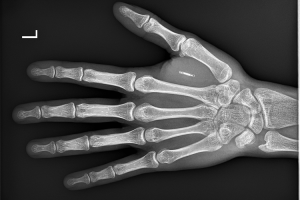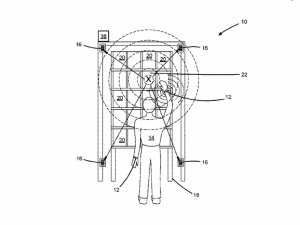Difference between revisions of "Human Microchipping"
| Line 47: | Line 47: | ||
https://www.freecodecamp.org/news/human-microchipping-an-unbiased-look-at-the-pros-and-cons-ba8f979ebd96/ | https://www.freecodecamp.org/news/human-microchipping-an-unbiased-look-at-the-pros-and-cons-ba8f979ebd96/ | ||
| + | |||
| + | [[Category:2020New]] | ||
| + | [[Category:2020Concept]] | ||
Revision as of 13:49, 17 March 2020
Human microchipping is the practice of inserting a glass encased transponder under the surface of the skin. These implants are already currently used widely to identify pets such as cats and dogs, and usually contain identifying information that can be scanned using radio frequency identification (RFID) or near field communication (NFC), both of which utilize radio waves. In humans, it is possible that these devices could be used in a wide variety of scenarios to increase ease of use for everything from accessing bank accounts to starting cars. While they are already quite popular in Sweden, where one train company recently experimented with microchips serving as tickets, there are several concerns with the security and ethicality of widespread human use.
How They Work
RFID transponder and NFC microchips are currently most widely used. They store a single unique identifying number that can only be read by specific radio scanners. Once brought into proximity, the scanner can read the identifying number and access a secure database where the individual’s information is then brought up. Notably, RFID microchips only work in one direction, where “data flows from the tags to the reading equipment” (Chandler). NFC microchips, however, can be used for both one and two way communication. In 2 way communication, the chip is able to send information to the scanning device beyond just an identification number. This can be utilized to quickly and rapidly share information and link devices. For example, a doctor could attach a NFC device to you that could, using your cellphone as an intermediate, give them real time health data on you (Chandler).What Are The Implications?
It is worth noting that NFC microchips are currently seen as the “future” of human microchipping on account of their clear wider usability. Although they are relatively new, this technology is already being used in contactless credit cards. There, however simply hundreds of possible ways this technology could be abused, but most of them center around individuals privacy regarding their information.
Amazon already tracks its warehouse employees whereabouts through the hand scanner they need to work. These scanners are outfitted with GPS, and workers are expected to take them everywhere, even on break and to the bathroom (NYpost.com). Then, in 2018, Amazon won a patent for a wristband that can precisely track its worker’s locations and can even vibrate when they are not going in the correct direction (theguardian.com). These implants, it seems, would be a natural extension of this corporate tracking, one which would not be removable at the end of the day. It is also important to note that these microchips are entirely reprogrammable even after they have been inserted. The concern is that companies could insert a microchip under some agreement, then reprogram it to track their employees round the clock.
Already, companies are tracking your every move through your cell phone, even if they say they aren’t and putting that data up for sale, and companies like amazon with shady ethical histories are sure to do the same (nhpr.org). They would then know things like every time you’ve called in sick and used the day to do something else, or if you really just slept in and that made you late for work. Even more frightening is the possibility of companies providing a NFC microchip with more capabilities than they intend to use, and then later activating them. For example, a company could insert a microchip that they claim would only be used to unlock doors, but also includes biometric sensors, GPS capabilities, and with capabilities to access your credit card transaction history. The chip would go around, recording these aspects of your life, and the next time you entered the facility using it, all that information would be downloaded to their servers to build up a profile on you. Or, since it is relatively easy to set up hidden scanners all over the place, companies could do just that and get real time updates on individuals.
This is information that employers have no right to have access to, and is a huge violation of privacy, but could be the reality if use of these microchips becomes widespread. This abuse of technology is not limited to just employers, but could extend to government oversight, parental oversight, and even to cases that are currently unfathomable. The government could, for example, force all its employees to be implanted with microchips, and abuse them in a similar way companies could. If the government has access to people’s information such as this, however, it could prove costly to many freedoms people take for granted. People could be implicated in crimes they did not commit simply because they happened to be in the area where the crime took place. Even if they are eventually found innocent, it could prove a huge financial and mental burden.
Moreover, local police departments could theoretically use the chips to do things like track when people are speeding and issue citations through the mail. Parents could force their children to be chipped and could track them wherever they go. There is much discussion of the utility of these devices medically, but here there is a huge risk for abuse. Microchips biotech is currently developing a device that could deliver regular doses of medication, but it is again possible that employers or the government could gain access to this information through the chips and learn about ones private medical history (digitalethics.org). For example, if an implant had the ability to track hormones, it is possible that employers could learn someone is pregnant before the individual themselves is aware of it, and then take discriminatory action against that employee.
The Point
There are a thousand other conceivable cases where microchips could be abused, and the limits on what can be incorporated into the technology is quite literally limitless. What’s more, these implants are hackable, although not easily. Regardless, given the sensitivity of the information these microchips could hold, this is an extreme risk. The root of the problem here is consent. Employers, the government, and parents can coerce people into getting these implants even if they don’t want them. Although it is technically consent, people likely will not understand what they are really getting themselves into. This is the largest distinguishing factor between what microchips will do and what cell phones currently do: control and agency. Although their uses will undoubtedly overlap, it is far easier to manage what one’s cell phone knows about them, and if it really comes to it, one can elect to turn it off. Microchips, on the other hand, remove this element of choice. There is no option to block a certain app from tracking you, no option to not send your data to the company, no option to turn it off, it is always on, and always watching.
Sources
https://medium.com/@kaylajheffernan/microchip-misconceptions-how-they-really-work-5694b483ff1f
https://electronics.howstuffworks.com/difference-between-rfid-and-nfc.htm (Chandler)
https://nypost.com/2019/07/13/inside-the-hellish-workday-of-an-amazon-warehouse-employee/
https://www.theguardian.com/technology/2018/jan/31/amazon-warehouse-wristband-tracking
https://www.digitalethics.org/essays/implanting-microchips-sign-progress-or-mark-beast
https://www.nhpr.org/post/how-tech-companies-track-your-every-move-and-put-your-data-sale#stream/0
http://theconversation.com/microchip-implants-are-threatening-workers-rights-107221

